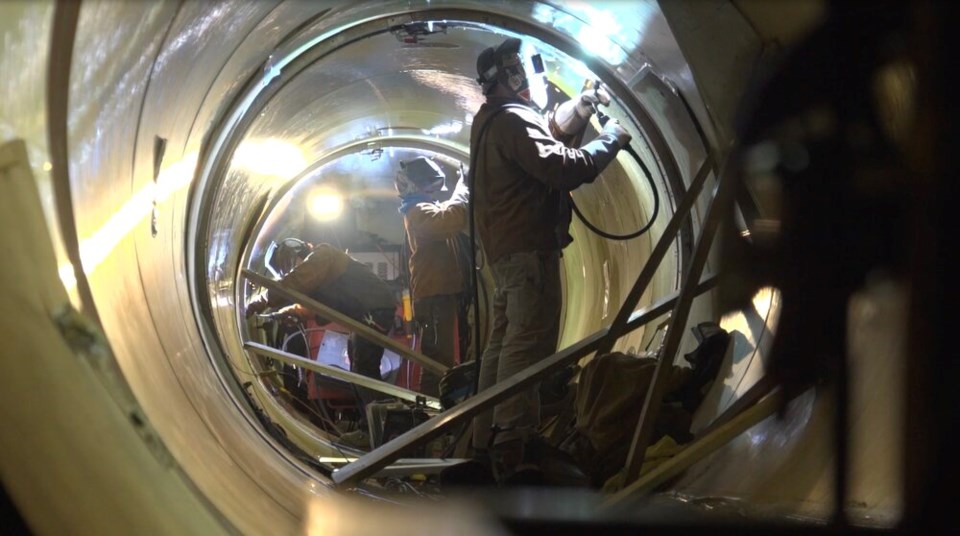Metro Â鶹´«Ã½Ó³»is preparing to dig a 1.4-kilometre tunnel deep under Stanley Park in a bid to maintain a supply of drinking water to the region.
Construction of the new tunnel is set to begin in mid-November 2024 and won’t wrap up until 2029.
The $495-million project will replace old infrastructure from the 1930s and connect it to an existing underwater pipe that funnels water from the Capilano mountain reservoir on the North Shore to homes and businesses south of the Burrard Inlet, said Murray Gant, Metro Vancouver’s director of major projects for tunnelling.
“The Capilano Main Number 4 provides about a third of the drinking water to the region,” said Gant. “It’s the main source of drinking water to the City of Â鶹´«Ã½Ó³»and Richmond.”
The pipe is part of a water supply system that provides the region’s 2.8 million residents about a billion litres of drinking water a day in the winter, and 1.5 billion litres of water in the summer.
Once completed, the Stanley Park water supply tunnel has a design life of a century. Barring any natural disaster, Gant says Metro engineers expect it could last more than 200 years.
Crews to drill 50 metres under park
Plans to replace the existing Stanley Park water pipe accelerated in 2016, when the water main began leaking onto a road near Lost Lagoon. Smaller leaks have been reported since then.
The old 1.8-metre-wide steel pipe sits about 1.5 metres below the surface of Stanley Park. Once the old infrastructure is removed, a new 2.6-metre-wide steel replacement pipe will be dropped 50 metres underground.
Construction crews are planning to excavate three shafts to access that depth.
The first shaft will emerge on the north side of Stanley Park, where the new tunnel will connect to existing infrastructure that brings treated drinking water under Burrard Inlet.
Another shaft in the centre of the park will act as the main construction site. This is where most of the drilled sandstone bedrock will be pulled up to the surface.
Tunnelling will move north and south from the central shaft. Crews will use a small excavator with a rotating head that chews up the rock in an inverted U-shaped tunnel 4.5 metres wide.
A third shaft will see daylight on the northeast side of Vancouver’s Chilco Street, adjacent to the park’s Lost Lagoon. Two new valve chambers will be installed at the site to control water flowing through the pipes.

Project to bring noise, traffic disruptions
The project will permanently shift Stanley Park’s Tunnel Trail south of the Burrard Inlet shaft site, according to Metro Vancouver. Other paths are expected to be temporally re-routed inside the park.
Construction is scheduled to run weekdays from 7:30 a.m. to 8 p.m., and on Saturday from 10 a.m. to 8 p.m.
Local residents have expressed concern the project would impact traffic and increase noise in the area near Lost Lagoon.
Gant says the regional government has required contractors to adhere to a number of measures to mitigate noise, dust and traffic. He said extensive environmental studies have been carried out, and he doesn’t foresee the project causing negative effects to wildlife, including the great blue heron nearby.
A three-metre tall sound barrier, as well as a pedestrian and bike path, will be built around the downtown shaft site before digging begins. Crews will also deploy street watering and wheel washing stations to manage dust.
Traffic is expected to be disrupted in the area as trucks access the site and temporary bollards are installed on Chilco Street to prevent the flow of vehicles between Robson and Alberni Streets. Metro says it will install signage to help reduce congestion.
Metro Â鶹´«Ã½Ó³»says it is hosting public consultations to answer the public’s questions about the project. A community open house is scheduled to run Nov. 7, 2024, between 5:30 and 7:30 p.m. in King George Secondary School’s cafeteria at 1755 Barclay St. in Vancouver.



